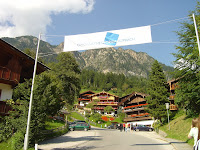Barcelona Graduate School of Economics offers a range of competitive Master programs in Competition and Market Regulation; the Economics of Science and Innovation; International Trade, Finance, and Development; and Macroeconomic Policy and Financial Markets (awarded jointly by the Universitat Autònoma de Barcelona and the Universitat Pompeu Fabra) and Master programs in Economics and in Finance (awarded by the Universitat Pompeu Fabra).
There are four main criteria for admission: academic preparation, English language requirement, quantitative skills (GRE/GMAT), and letters of recommendation. The application process to the Barcelona Graduate School of Economics is conducted entirely online.
- Non-European students: July 15, 2010*
- European students: August 1, 2010*
*This date is subject to places available in each Master program. If the total number of places in a Master is covered, no more applications will be reviewed.
Even though the application period is long, students are encouraged to apply early to enhance their chances of acceptance. In particular, if you are applying to the Master in International Trade, Finance, and Development, we advise that you send your application by May 31.
Financial Aid
Thanks to the participation of a number of companies and institutions, the Barcelona GSE is able to offer a limited number of scholarships based on academic merit. These financial awards help the School attract the best and brightest international students and are highly competitive.
Fully-funded scholarships
“La Caixa” Foundation - Scholarships for students from emerging and developing countries
The “la Caixa” savings bank Foundation and the Barcelona GSE offer 14 fully-funded scholarships to students from emerging and developing countries (*) with excellent academic backgrounds who will return to their home countries at the end of their professional training process to implement their knowledge.
This award covers:
- master program tuition
- medical insurance
- round-trip airfare from the student's country of residence
- monthly stipend for expenses during the student's stay in Barcelona
(*) Note: “Emerging and developing countries” is an expression used to name all countries not included on the following 2008 IMF list of “advanced economies”: Australia, Austria, Belgium, Canada, Cyprus, Denmark, Finland, France, Germany, Greece, Hong Kong SAR, Iceland, Ireland, Israel, Italy, Japan, Luxembourg, Malta, Netherlands, New Zealand, Norway, Portugal, Singapore, Slovenia, South Korea, Spain, Sweden, Switzerland, Taiwan, United Kingdom, United States of America.
BBVA Foundation - Barcelona GSE Scholarships for Latin American students
The BBVA Foundation and the Barcelona GSE offer 5 fully-funded scholarships to Latin American students with outstanding academic backgrounds applying to any master program. Two of the awards are especially for Mexican candidates and the other three are open to candidates from the rest of Latin America.
This highly selective award covers:
- master program tuition
- medical insurance
- round-trip airfare from the student's country of residence
- monthly stipend for expenses during the student's stay in Barcelona
Internship-Scholarship Program - Catalan Foundation for Research and Innovation
This unique scholarship will be awarded to one student in the MSc in Economics of Science and Innovation (MESI) program. The scholarship combines full tuition coverage for the master program with a paid 6-month internship at the Catalan Foundation for Research and Innovation (FCRI). The internship is to take place from January through June of the master year on a part-time basis and full-time in July after graduation.
Tuition waiver grants
The support of the following sponsors enables the Barcelona GSE to offer full or half-tuition waivers. These awards are addressed to outstanding students applying to any master, with the exception of the Fundación Carolina scholarships, which are available only to students applying to the Master in Competition and Market Regulation and the Master in the Economics of Science and Innovation. Applicants are informed of scholarship awards at the time of the admissions decision.
More information about the programs and application process: http://www.barcelonagse.eu/Programs.html











